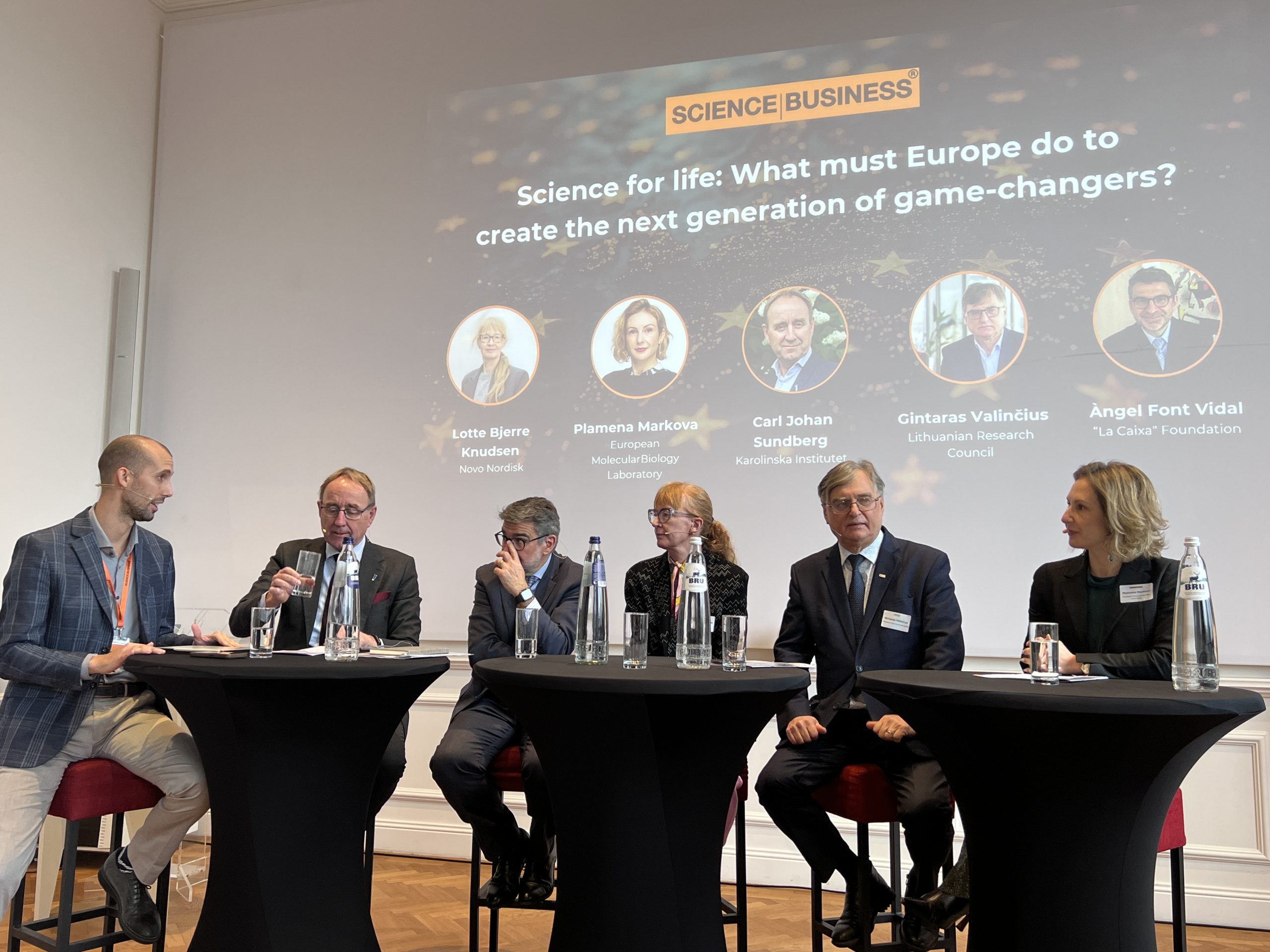
Gintaras Valinčius, Chairman of the Research Council of Lithuania, participated in the panel discussion “Science for Life: What Must Europe Do to Create the Next Generation of Game-Changers?” as part of the Science|Business* annual conference “New Mandate, New Agenda: Will the EU Live Up to Its Promises on R&I?”
Throughout the 20th century, Europe’s health and life science (HLS) sectors were leaders in industrial innovation. However, since the millennium, advanced R&D, talent, and intellectual assets have shifted to the US and Asia. President von der Leyen’s Commission has pledged to create a Biotech Act and Life Sciences Strategy to boost HLS competitiveness, yet the revision of Europe’s pharmaceutical legislation has entered its third year. This raises questions about Europe’s position in the global race and whether its HLS ecosystem is prepared for future breakthroughs. What needs to change to stay competitive?
Europe has long been a hub for scientific excellence, thanks to its strong academic institutions, risk-taking culture, and collaborative research environment. However, several obstacles continue to hinder progress. Limited funding opportunities, slow commercialization of research, and a fragmented capital market often force European biotech firms to seek financial support in the U.S., where a larger market and better incentives attract investment. Addressing these challenges, G. Valinčius emphasized that investing in research is not just about funding – it is equally crucial to invest in people: “Innovative ideas come from people, not money. However, if we invest public funds into research, we also expect a return.”
To remain competitive, Europe must develop a more integrated research ecosystem – one that bridges academic research, industry collaboration, and supportive regulatory frameworks. The importance of patient capital – long-term funding that accounts for the lengthy development cycles in life sciences – cannot be overstated. Additionally, fostering translational scientists – researchers who understand both scientific discovery and commercialization – could help accelerate the journey from innovation to market-ready solutions.
Beyond funding and infrastructure, G. Valinčius underscored the very nature of scientific pursuit. True science, he argued, is driven by curiosity, risk-taking, and pushing boundaries. It should not be confined to rigid structures but should instead embrace excitement, collaboration, and even artistic influences. Researchers are drawn not just by financial incentives but also by intellectual stimulation and the opportunity to bring discoveries to life.
The discussion also explored different funding and innovation models. Denmark, for example, historically allowed scientists to retain full ownership of their intellectual property, contrasting sharply with centralized governmental control. In Switzerland, despite minimal university patenting, researchers actively license their work and launch startups, fueling scientific entrepreneurship. These differing approaches raise a fundamental question: should Europe pursue a centralized or decentralized model for research commercialization? Speaking on EU programmes, G. Valinčius pointed out that most European initiatives consider only a linear innovation process, whereas in the life sciences sector, it is evident that innovation follows a cyclical process.
Another key debate within the scientific community is the division between those focused on publishing research and those dedicated to product development. While both are essential to scientific advancement, better collaboration between the two could accelerate the transformation of fundamental research into real-world applications.
Sustainable scientific progress requires a diversified funding landscape. While public funding has traditionally supported fundamental research, translating discoveries into marketable applications demands a mix of private investment, venture capital, and philanthropic contributions. To keep up with evolving scientific and economic challenges, Europe must adopt a more flexible, dynamic funding strategy.
Additionally, regulatory hurdles – such as the complexity of multi-country clinical trial approvals – continue to slow progress. Streamlining these processes through unified European regulations could strengthen the continent’s standing in global medical research.
A well-connected and integrated research ecosystem is vital for Europe to leverage its full potential. Attracting top talent remains an ongoing challenge, yet Europe offers unique advantages such as a high quality of life, cultural diversity, and strong societal values. By refining its scientific and industrial ecosystems, Europe can create an environment where researchers, innovators, and industry leaders collaborate effectively.
Crucially, research excellence should not be measured solely by publications. A more meaningful approach would consider real-world impact, ensuring that scientific advancements contribute directly to society and industry.
Finally, G. Valinčius raised a key question: “What do we need to finance – curiosity-driven research or research aimed at product creation?” His answer was clear: “Both. If we neglect basic research, Europe will not be able to catch up with the rest of the world or regain its competitive edge.”
To remain a global leader in science and innovation, Europe must adapt its funding models, regulatory structures, and collaboration strategies. A holistic approach – balancing academic freedom, financial incentives, and supportive policies – will be essential in driving the next generation of groundbreaking discoveries. By fostering a culture of innovation, streamlining regulatory frameworks, and securing long-term funding, Europe can strengthen its position at the forefront of global scientific advancement.
* The Science|Business Network of universities, companies, and research and policy organisations is a uniquely powerful forum for driving innovation forward. Network features 70+ internationally acclaimed members, public and private, which fund or perform cutting-edge research and innovation across sectors and borders.
Lithuanian RDI Liaisons Office in Brussels (LINO)
